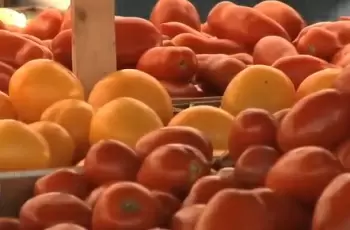Your vegetables may contain toxic chemicals

26-July-2012
Vol 3 | Issue 29
The soft, shiny red exterior of tomatoes or the lush, green texture of peas and leafy veggies might tempt one's taste buds and their "freshness" might appeal to the eyes, but there lies something sinister beneath - a toxic concoction of hazardous chemicals.
Says Utpal Raychaudhuri, a senior scientist at the Department of Food Technology, Jadavpur University: "The consumption of raw fruits and vegetables has become a paradox. The rampant use of chemicals contravenes their nutritional benefits."
 |
|
The vibrant green exterior of green peas and chilies are a result of the unscrupulous use of malachite green, a textile dye, a well-known carcinogen
|
Chemicals such as copper sulfate, rhodamine oxide, malachite green and the deadly carbide are the ones most commonly used to accentuate coloration and freshness.
"These are neurotoxic (affecting the brain) causing Alzheimer's and dementia and are also carcinogenic. In addition, they speed up the ageing process," Raychaudhuri said.
The vibrant green exterior of green peas and chilies are a result of the unscrupulous use of malachite green, a textile dye, a well-known carcinogen.
Other green vegetables such as lady's finger, bitter gourd and the other gourd varieties are given a facelift by being washed in copper sulfate, commonly known as blue vitriol.
Saraswati, a roadside vendor off South Kolkata's Bhowanipore, admitted: "All our green vegetables have been treated with 'neel' (copper sulfate) at the wholesalers market in Sealdah and Baruipur."
Copper sulfate is a major constituent of fungicides in agriculture and its ingestion affects the liver and kidneys and causes the formation of free radicals in the body which augment the ageing process.
At the other end of the spectrum, rhodamine B, which is a carcinogen, imparts the bright red hue to cherries. This dye is used in markers and also as an agricultural pesticide. It is a skin irritant.
Vendors also frequently use calcium carbide, commonly known as carbide, to artificially ripen fruits like bananas and mangoes.
"Raw mangoes are laced with carbide the moment they arrive at the wholesalers' markets," revealed Mohan, a small-time vendor at Salt Lake.
Used in the steel industry, carbide results in neural problems and is also a carcinogen.
To take it up a notch higher, vendors rub petroleum oil on the surfaces to provide a glazed look to vegetables like tomatoes and brinjals.
Petroleum oil's toxic effects include respiratory and gastrointestinal problems.
Pointing to the lusciously red tomatoes, Ratan Lal, a roadside vendor near Jadavpur, said: "The moment you cut them open, you can see they aren't ripe. They arrive from the wholesalers like this."
Although thorough washing of the surfaces of fruits and vegetables is advised to get rid of the chemicals, this does not guarantee safety.
Explaining why, Raychaudhuri said: "Washing does not eliminate the chemicals that have already penetrated into the interior. Besides, when it comes to non-water soluble additives such as petrol oil, it fails."
"Consumers should also keep in mind that these fruits and vegetables have already received pesticide treatment prior to their display in the markets and further colour and freshness enhancements only make them deadlier", said Raychaudhuri.
"Troubleshooting should include good agricultural practices and setting up standard limits to their use," he said. - IANS
















